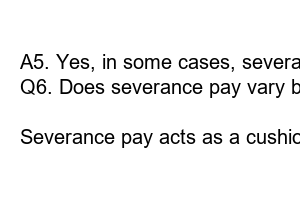퇴직금 조회
Title: Understanding Severance Pay: A Comprehensive Guide for Employees
Introduction:
When it comes to leaving a job, one of the concerns that often arises is severance pay. Many employees are unsure about what exactly severance pay entails, how it works, and what they are entitled to. In this blog post, we will delve into the intricacies of severance pay, providing you with a clear understanding of this crucial aspect of employment.
1. What is Severance Pay?
Severance pay is a financial compensation that an employer may provide to an employee who is being laid off, fired, or whose position is being eliminated. It acts as a form of financial support during the transition period between jobs.
2. Who is Eligible for Severance Pay?
While not all employees are entitled to severance pay, it is typically offered to employees who have been with a company for a certain period of time, such as a year or more. However, eligibility requirements can vary depending on the company’s policies, employment agreements, and local labor laws.
3. How is Severance Pay Calculated?
Severance pay is calculated based on various factors, including the employee’s length of service, salary, and position within the company. A common calculation method is to provide a week or month of pay for each year the employee has worked for the company.
4. Can Severance Pay Be Negotiated?
Yes, severance pay is often negotiable, especially if an employee has valuable skills, holds a high-ranking position, or has an employment contract that includes specific severance terms. It is crucial to approach negotiations professionally, considering the reasons for termination, the employee’s value to the company, and any legal obligations.
5. Tax Implications of Severance Pay
Severance pay is typically subject to income tax, as it is considered part of an employee’s compensation. However, tax regulations vary by jurisdiction, so it is important to consult with a tax professional to understand how severance pay will impact your individual circumstances.
6. Common Misconceptions About Severance Pay
There are several misconceptions surrounding severance pay. Some employees mistakenly believe that it is an automatic entitlement or that it is only offered in cases of wrongful termination. However, it is important to remember that severance pay is usually at the discretion of the employer and can be offered even in situations where termination was lawful.
FAQs:
Q1. Is severance pay legally required?
A1. In most jurisdictions, there is no legal obligation for employers to provide severance pay. However, local labor laws may require it in specific situations, such as mass layoffs.
Q2. Can severance pay be revoked?
A2. Once an employer and employee have reached an agreement on severance pay, it is generally binding. However, breaches of any signed agreement can potentially lead to legal action.
Q3. How long does it take to receive severance pay?
A3. The timing of severance pay can vary depending on internal payroll processes and any agreements made between the employer and employee. It is advisable to clarify this timeline during negotiations.
Q4. Can severance pay affect eligibility for unemployment benefits?
A4. Generally, receiving severance pay does not disqualify an individual from receiving unemployment benefits. However, local regulations and the specifics of the severance agreement may influence this.
Q5. Can severance pay include benefits?
A5. Yes, in some cases, severance packages may include continued health insurance coverage, retirement benefits, or other perks. The inclusion of such benefits can be part of the negotiation process.
Q6. Does severance pay vary between industries or job levels?
A6. Yes, severance pay amounts can vary significantly based on industry norms, job levels, and the employer’s policies. Higher-ranking employees or those in executive positions may typically receive more substantial severance packages.
Summary:
Severance pay acts as a cushion during employment transitions, providing financial support to employees who are laid off or face job termination. While not a universal entitlement, it is an important consideration for both employers and employees. By understanding the intricacies of severance pay, employees can ensure fair treatment and negotiate the best possible terms during times of job loss.

